Craps Bets Explained
There are many different ways to bet in craps - from place vs buy bets, pass bet, come bet and more! Deciding how to play might seem intimidating to a beginner. The good news is that it’s fairly easy to get started if you know a few key bets! One of the advantages to playing craps online is that you can take your time and learn as you play, without the commotion of a traditional casino craps game rushing you to bet. Read our expert guide below to get started!
Need more info about the rules before you’re ready to start thinking about placing bets? Check out our comprehensive guide to playing craps for beginners.
Types of Craps Bets
In craps, bets can be divided into single roll bets, also known as proposition or 'prop' bets, and multi-roll bets. Prop bets only count for one roll from the shooter and expire immediately after. Multi-roll bets take several rolls from the shooter before they are resolved.
Prop bets are riskier, but the potential payouts are generally higher. It's easy to lose a lot of money quickly on certain prop bets, so we recommend beginner players first learn the craps payout odds and house edge of these bets below.
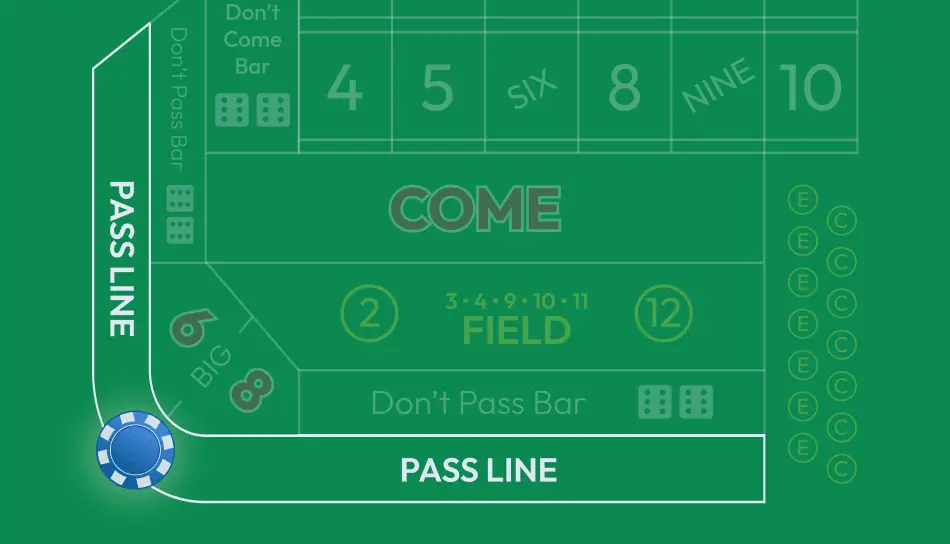
Pass Line Bet
The most popular craps bet, the pass line, has a house edge of just 1.41% and is the easiest wager to make. A pass line bet means players wager on the shooter landing a 7 or 11 before a 2, 3 or 12 on the come-out roll. If the dice land on 7 or 11, the pass bet wins; if it lands on 2, 3 or 12, it loses. If it rolls on any other number, the pass bet stays active on the craps table until the shooter lands the point number again, or a 7. Once a point is established, this bet stays until the point repeats (win) or a 7 rolls (lose).
Single or Multi-roll: Multi-roll
Payout odds: 1:1 (even money)
House edge: 1.41%
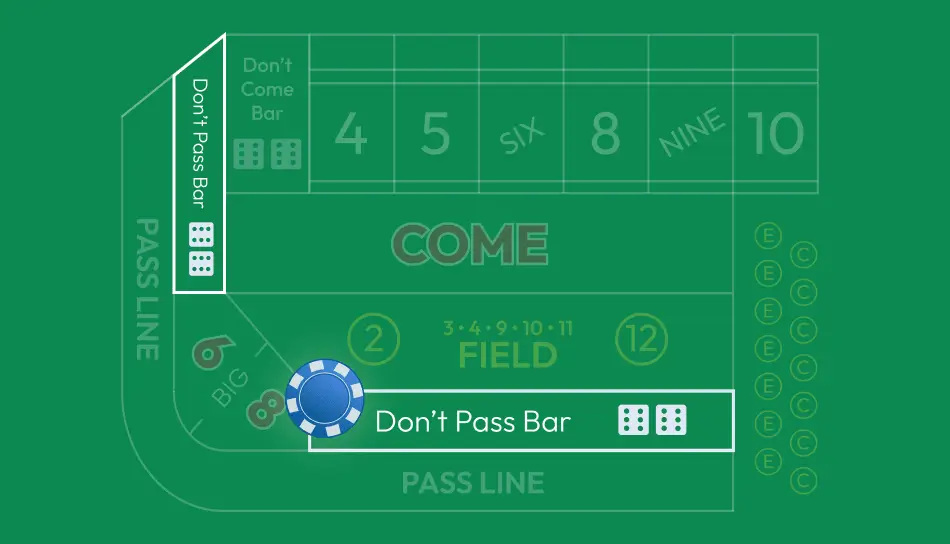
Don't Pass Line Bet
The reverse of a pass line bet; this bet can be placed on the come-out. Don't pass line bets win on a 2 or 3 roll, while a 7 or 11 will lose. After a point is set, you win if 7 comes before the point, push on 12, and lose if the point repeats. While the lower house edge on this bet may be appealing, it's an unpopular bet at the craps table because the player is essentially betting on other gamblers to lose.
Single or Multi-roll: Multi-roll
Payout odds: 1:1 (even money)
House edge: 1.36%
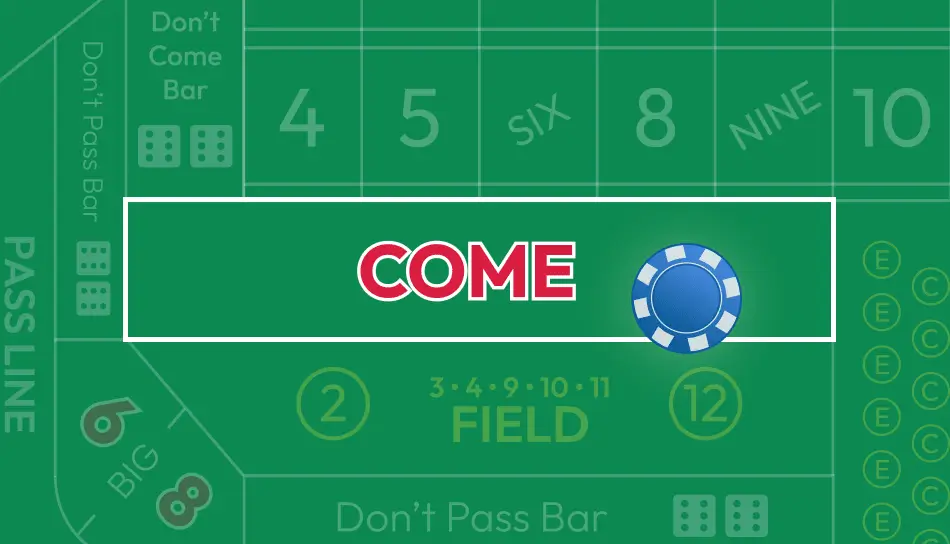
Come Bet
Players can make this bet at any time after the point on the pass line has been set, but the rules are exactly the same as those for a pass line bet. On the next roll, 7 or 11 wins; 2, 3, or 12 loses. If you roll any other number, that becomes your come point and you win if that number repeats before a 7.
Single or Multi-roll: Multi-roll
Payout odds: 1:1 (even money)
House edge: 1.41%
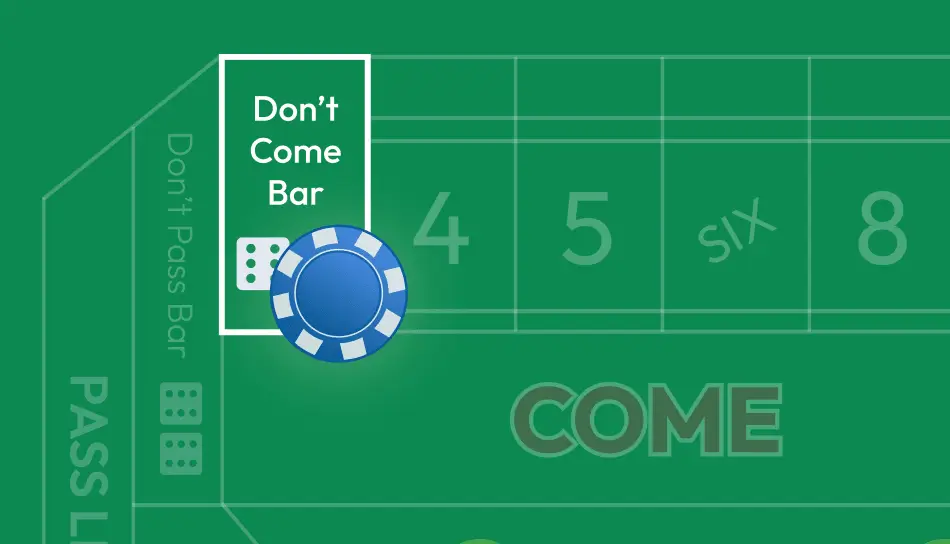
Don't Come Bet
The reverse of the come bet. You can place a don’t come bet after a point is set. On the next roll, 2 or 3 wins, 7 loses, 12 pushes. Any other number you roll becomes your don’t come (DC) point. You win if a 7 comes before that number and lose if that number repeats.
Single or Multi-roll: Multi-roll
Payout odds: 1:1 (even money)
House edge: 1.36%
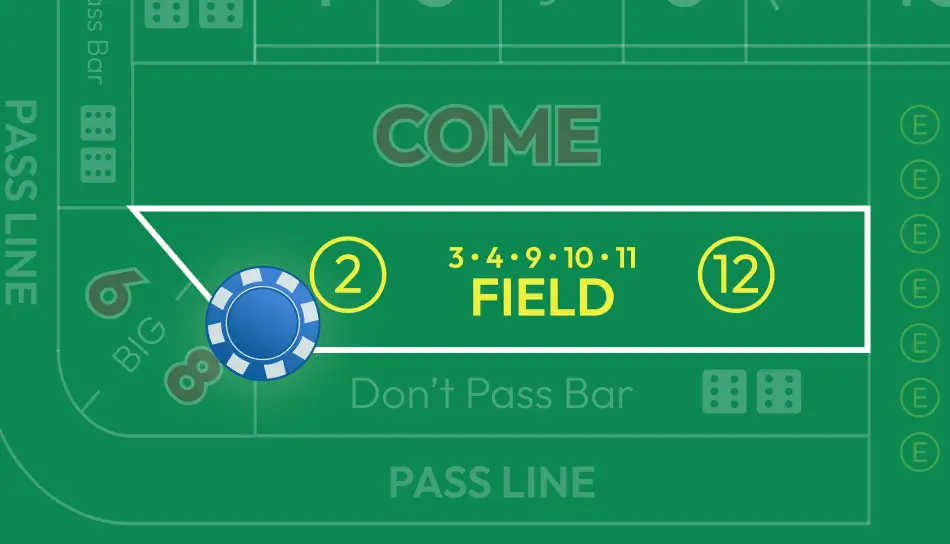
The Field Bets
A nifty wager for a single roll of the dice at any time. The field bet sees the player win if they throw a 3, 4, 9, 10, or 11, a double payout on a 2, and triple if a 12 is rolled. To counter these winnings, a bet is lost if the dice lands on a 5, 6, 7, or 8. Some casinos and table variants only offer a double on 12, so be sure to check the listed payouts.
Single or Multi-roll: Single roll
Payout odds: 2:1 for 2 and 12; 1:1 for all other numbers
House edge: 2.78% (5.56% if 12 is double)
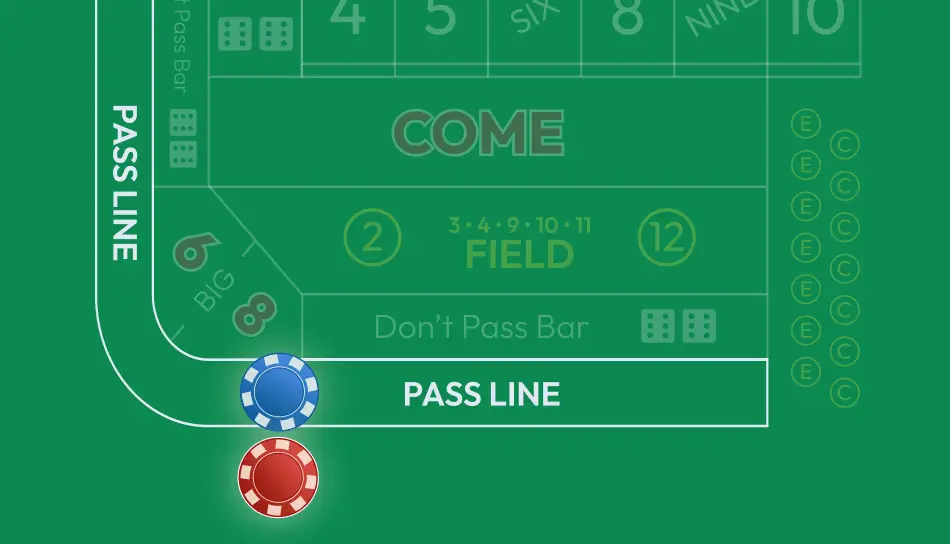
Taking the Odds Bets
After a pass line or come bet has a point, you can add Odds behind it. This bet pays at true odds and has no house edge on the odds portion. You win the bet if the point or come point repeats before a 7 is rolled; you lose if 7 rolls first.
Single or Multi-roll: Multi-roll
Payout odds: 2:1 on 4 or 10; 3:2 on 5 or 9; 6:5 on 6 or 8
House edge: 0% on odds portion
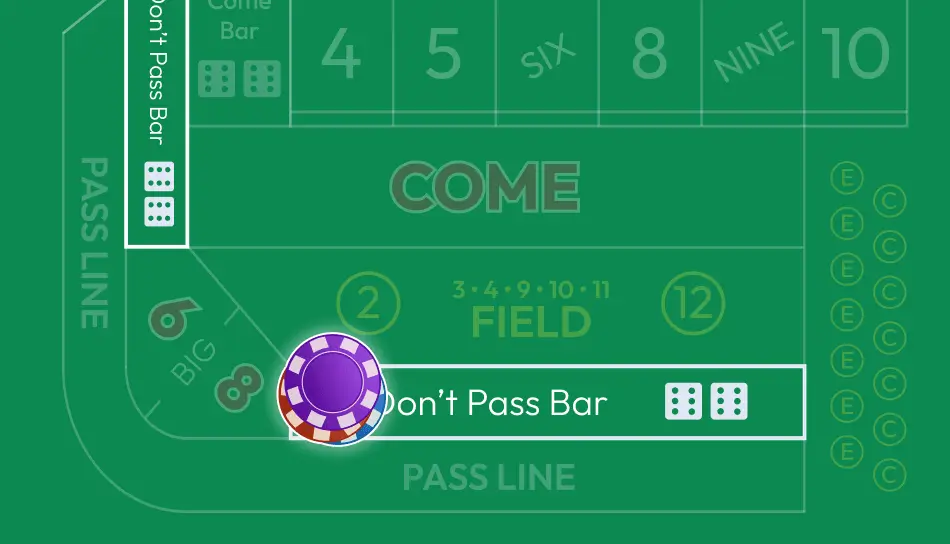
Laying the Odds Bets
After a don’t pass or don’t come bet has a point, you can lay odds. On this bet, players wager that the dice shooter will roll a 7 before the point/DC point. As with taking the odds, this bet has no house edge, making them both very popular bets with craps players.
Single or Multi-roll: Multi-roll
Payout odds: 1:2 on 4 or 10; 2:3 on 5 or 9; 5:6 on 6 or 8)
House edge: 0% on odds portion
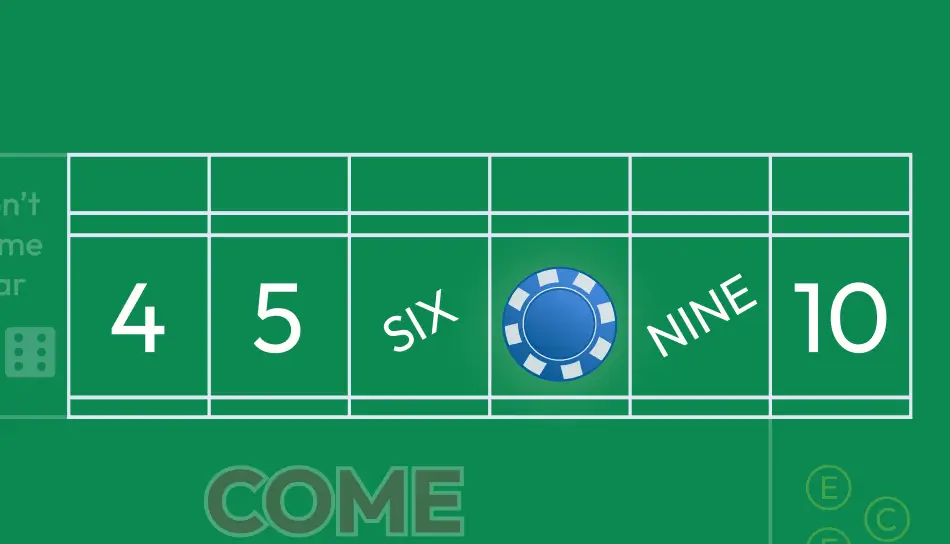
Place Bets
Place bets can be made at any time during a game of craps but are often played when a point number has already been determined. The idea is that the player makes a bet on a number that must be rolled before a 7 is thrown. There are three different payouts and house edges for each dice number wagered on.
Single or Multi-roll: Multi-roll
Payout odds: 9:5 for 4 or 10; 7:5 for 5 or 9; 7:6 for 6 or 8
House edge: 1.52% on 6 or 8; 4% on 5 or 9; 6.67% on 4 or 10
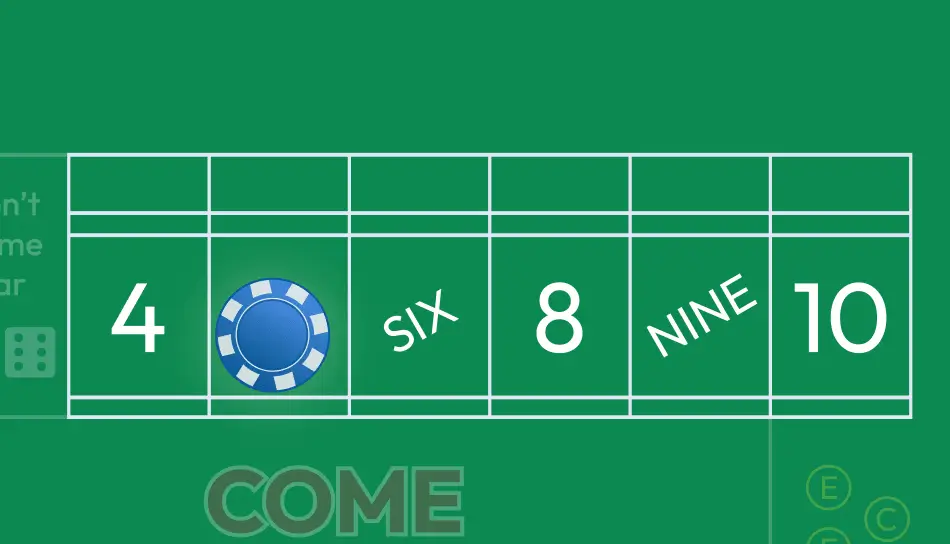
Buy Bets
Similar to a place bet, a buy bet is made on the shooter landing a specific point number before landing a 7. If a buy bet wins, the casino pays out at true odds, but takes 5% of the winnings as commission. Some casinos will charge the commission on the buy bet before the dice are thrown, others will only take it if the buy bet wins. As a result, the house edge on this bet can be fluid.
Single or Multi-roll: Multi-roll
Payout odds: 2:1 on 4 or 10; 6:5 on 6 or 8; 3:2 on 5 or 9
House edge: 4.76%, or less if the casino only takes commission on winning bets.
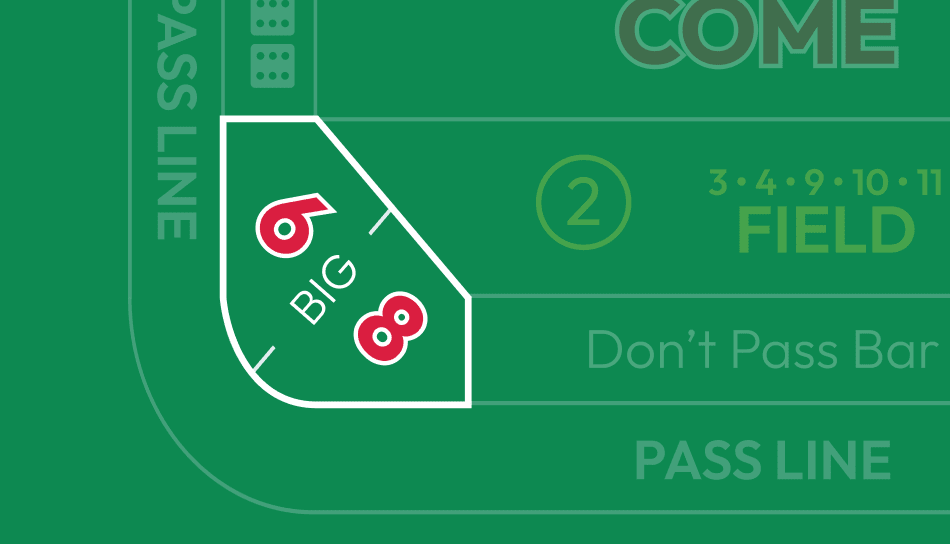
Big Six, Big Eight
Another bet that can be placed at any point during a game of craps, the big six, big eight wager pays out if a 6 or 8 is thrown before a 7. Many players avoid betting big 6/8 because of its high house edge and simply place bats on 6 and 8 instead, which pays 7:6.
Single or Multi-roll: Multi-roll
Payout odds: 1:1
House edge: 9.09%
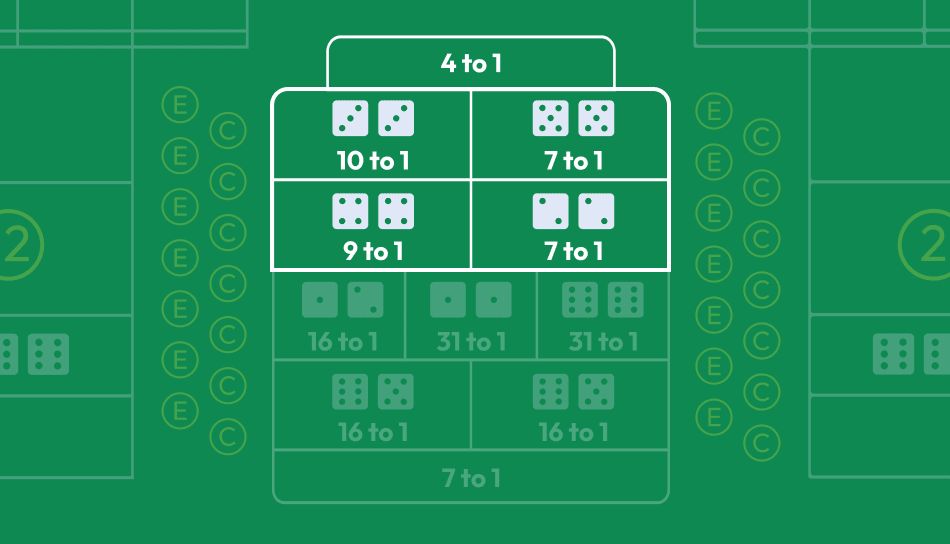
Hardways Bets
Winning the hard way means the total is made of doubles (e.g., a “hard 8” is rolling two 4s). A hardways bet wins only if the hard number rolls before a 7 or before the easy way rolls, i.e., before rolling 6 plus 2 to make 8.
Single or Multi-roll: Multi-roll
Payout odds: 9:1 on 6 or 8; 7:1 on 4 or 10
House edge: 9.09% on 6 or 8; 11.11% on 4 or 10
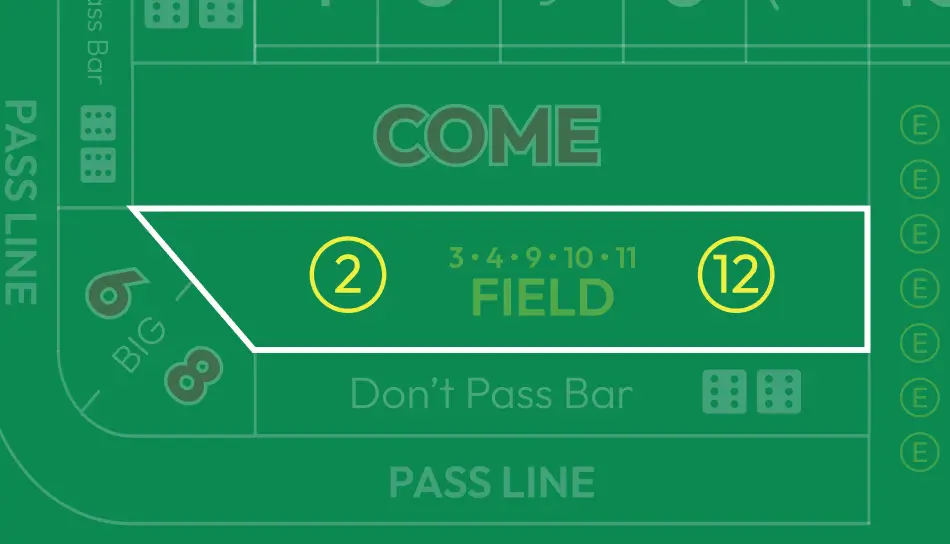
2 or 12 Bets
The 2 and 12 are the hardest numbers to land in craps, because there are so few dice combinations. This also makes this bet one of the most potentially lucrative, with a payout of 30:1. If players bet on the 2, then it must land on the next roll, else they lose. The same restrictions apply for the 12 bet. If any other number lands, the player loses.
Single or Multi-roll: Single roll
Payout odds: 30:1
House edge: 13.89%
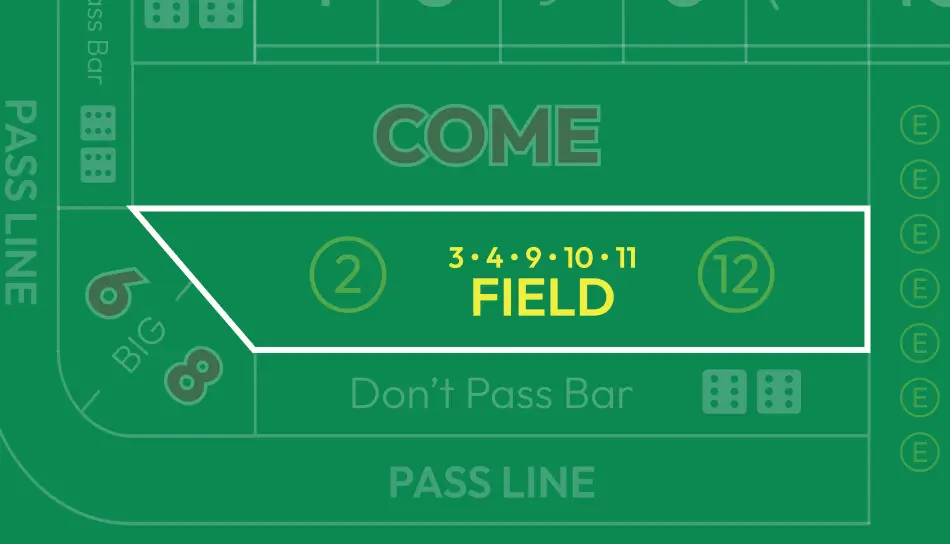
3 or 11 Bets
Similar to the 2 or 12 bet, players wager on the shooter landing a 3 or 11 on the dice before a 7 is thrown. If any other number lands, the player loses.
Single or Multi-roll: Single roll
Payout odds: 15:1
House edge: 11.1%
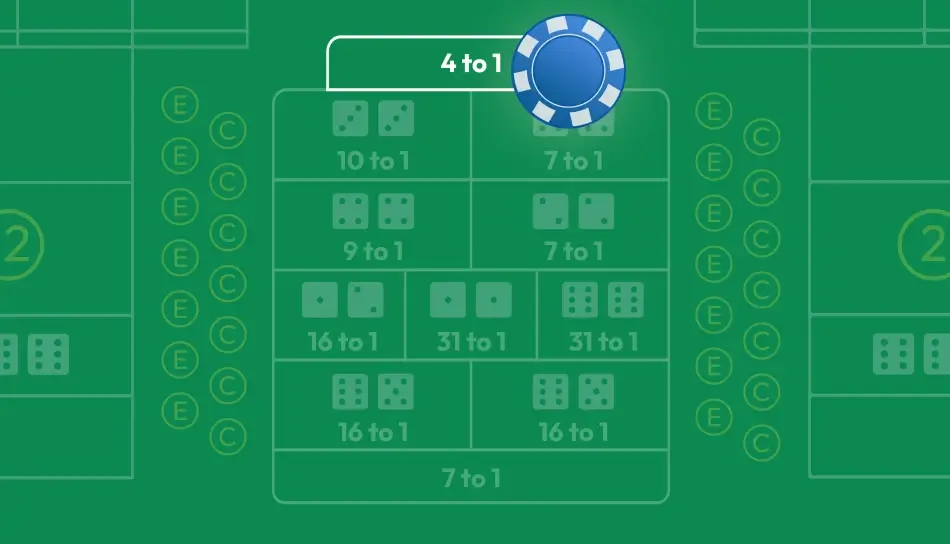
Any 7 Bet
The 7 is the number with the most combinations on the dice. It's tempting to bet on landing a 7 any way, but at 4:1, the payouts aren't as high as other craps bets.
Single or Multi-roll: Single
Payout odds: 4:1
House edge: 16.67%
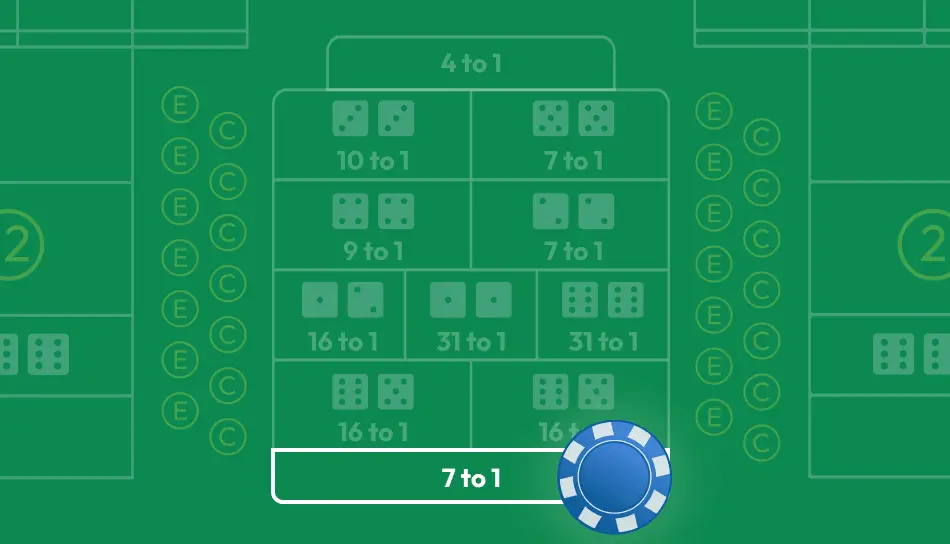
Any Craps Bets
It's common in craps games to refer to the 2, 3 or 12 numbers as 'craps numbers'. In an 'Any Craps' bet, players wager the shooter's next roll will land on one of these three numbers.
Single or Multi-roll: Single
Payout odds: 7:1
House edge: 11.11%
Top 5 Best Craps Bets
If you’ve already looked through the list above, you know there’s no shortage of options when placing your bets in craps. So where do you start? Most beginner or low-stakes craps players will use a low-risk approach that prioritizes bets with a low house edge even if they may not land the biggest winnings. For this style of play, we recommend these staple bets that players often start with::
- Pass Line Bet – classic come-out bet that pairs well with taking odds
- Don't Pass Bet – opposite of the pass line, has a slightly lower edge at most tables
- Come Bet – works like a new pass line after a point is set
- Don't Come Bet – works like a new don’t pass after a point is set
- Odds – added behind pass/come, pays at true odds with 0% house edge on the odds bet
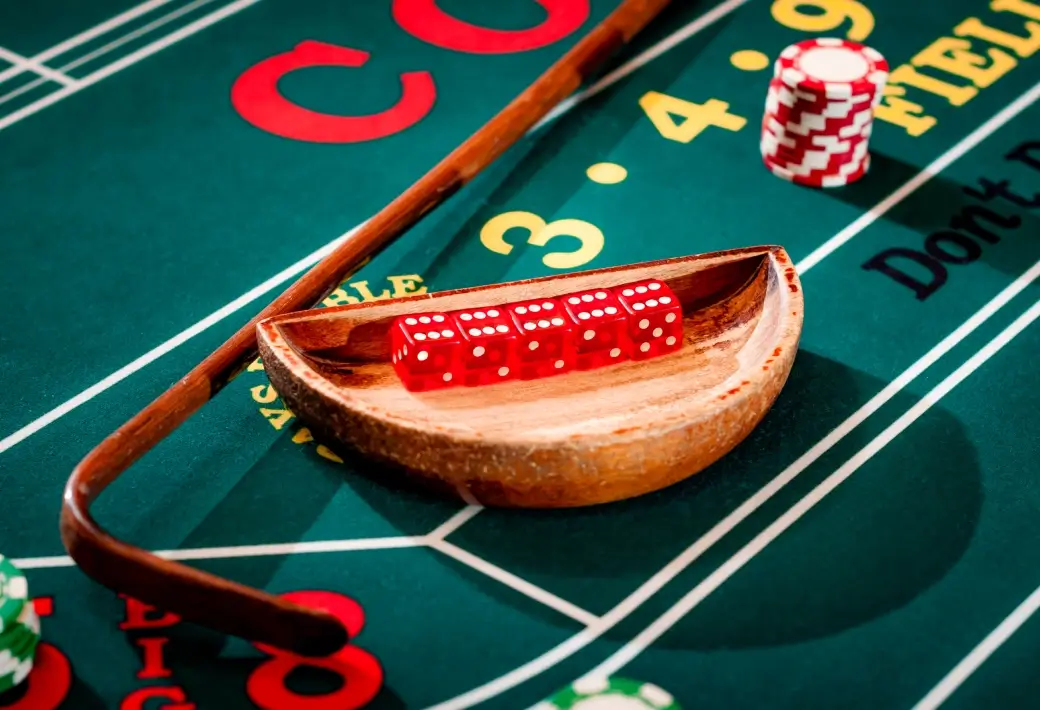
While the bets above are considered a low-risk strategy, they still make up the core backbone of strategy for many craps experts and high-stakes players.
Serious craps players build their action on the low house-edge core bets (pass/don’t pass, come/don’t come) and odds, with selective place/buy wagers. Prop bets such as hardways bets, or one-roll props such as any 7 or any craps are used more as side-action to create more excitement and entertainment or to hedge bets. They should generally not be used as a main betting strategy.
Craps Dice Chart
All craps bets center on the probability of the dice landing on a particular number. Of course, some numbers will land more frequently than others because the dice can land on more combinations than other numbers. For instance, the number 7 has six different dice combinations, whereas the number 11 only has two.
To understand why some craps payouts are much higher than others, look at the dice chart below. This will help explain why some bets pay out much more than others.
Craps Betting Tips for Beginners
Craps is a fun and exciting casino game, and if players understand how craps bets work, they can walk away from the table with a potentially decent payout. Use the tips below to help you extend your bankroll for more games and potentially improve your skill in craps betting strategies.
Avoid Tables with Minimums that Don’t Fit your Budget
The minimum bet limit may not appear too pricey at first, but after multiple craps sessions it can eat into your bankroll. Check online lobbies for lists of minimum and maximum bets and pick limits that keep your average bet within budget.
Use Online Casinos to Learn.
Unlike craps games in land-based casinos and live dealers, playing RNG craps games allows you to take all the time you need to place your bets. Many beginners find online casinos to be the best environment to learn how to play and practice craps betting strategies.
Practice on Free Games First
Online casinos usually offer demo versions of their games. These free games offer the same experience for bettors, only they don't risk their own funds. Free games are an excellent tool for practicing bets in craps or learning the rules.
Memorize the Possible Dice Combinations
By understanding the chances of various craps bets winning, beginner players can avoid losing money on prop bets with low chances of landing.
Take Advantage of Casino Bonuses & Perks
Casino sites want new players to choose them over their competitors. Beginner craps players can use this to their own benefit by finding the sites that offer the best casino bonuses for new sign-ups. While these bonuses may not always be available for playing craps, you’ll still get to try out other games or slots for free.
Don't Chase Losses
In craps, it's easy to get wrapped up in the excitement of the crowds and the fast-paced betting. Make a couple of bad wagers though, and you could find yourself making bad decisions you wouldn't make with a clear head. If this happens, walk away from the table – chasing losses never pays out.
Take Full Odds When Possible
Taking and laying odds are some of the most popular bets in craps for a reason. Since they pay at true odds, the odds portion of your bet has 0% house edge and lowers your overall edge.
Do not confuse place 6/8 with big 6/8
Although they may seem similar, they pay out differently and have different house edges. Big 6/8 has a 1:1 payout and 9.09% house edge, compared to placing 6/8 which pays out 7:6 and has a 1.52% edge. Most experienced players avoid betting big 6/8.
Craps Betting Strategy
In craps bets, all the action relies on the roll of the dice. Some players claim it's possible to control how dice land, but there's a variety of outside factors that affect craps which make the game truly random.
Instead, the best craps strategies for players focus on managing bankroll and minimizing the house edge. Combine this with the best bets we discussed earlier for your gameplay style, and these strategies can help you enjoy craps games for longer and walk away with some winnings.
To learn more about these strategies, check out our craps betting strategy guide for more information.
Try Craps for Free Online
Now that you know a little bit more about various craps games and the best way to place your bets, you can put your knowledge to the test by playing for free right here at Casino.us before you decide to deposit and play at a real money casino.
FAQs
What is an odds bet in craps?
Players can choose to make an 'odds bet' in craps after a point has been thrown. An odds bet is an add-on you can take after a point is set, and it pays out if the point is thrown before a seven. Because the odds on odds bets are exactly fair there's zero house edge, which also makes these one of the most popular bets in craps for players to make. If a player lands their odds bet, the payouts differ depending on the number: 4 and 10 pays 2:1; 5 and 9 pays 3:2; 6 and 8 pays 6:5.
What is a buy bet in craps?
A buy bet is like a place bet but pays true odds with a 5% commission. Many casinos take the commission only on a win for the 4/10, making Buy 4/10 better than Place 4/10. Rules vary from game to game and casino to casino, check how the vig is charged if you intend to place this bet at your casino of choice.
What's the difference between a place bet and a buy bet in craps?
The difference between these two bets is in the odds and commission. A buy bet pays at true odds, but the casino charged a 5% commission (also called a “vig”), usually only on wins. Meanwhile, a Place bet pays at payout odds that are set by the house and no commission is charged. If you are choosing between a place bet and a buy bet, calculate the potential payout, minus the vig and how it is taken, to help make the most worthwhile decision.
What is a lay bet in craps?
When a player makes a lay bet, they are betting that the shooter will land a 7 before rolling a specific point number. Essentially, a lay bet is the opposite of a buy bet, because the gambler is betting against the shooter. If a lay bet wins, the casino pays out at true odds, but takes a 5% commission from the winnings.
What is a yo bet in craps?
A yo bet is a one-roll wager on 11. Since the only way to roll 11 is a combination of 6 and 5, it has true odds of just 17:1, but typically it only pays out at around 15:1 for a house edge of about 11.11%.
What is a horn bet in craps?
While not all casinos offer the horn bet, players will find this option in the center of the craps table with the other prop bets. The horn bet is a single-roll bet split between 2, 3 11 and 12. So, if a player wagered on the horn bet it would be split each between the four numbers. If the dice land on 2 or 12, the payout is 30 to 1. If they land on 3 or 11, the payout is 15 to 1.










